
Worried about the unseen dangers lurking in your family’s food? It’s time to rethink what goes in your grocery cart. Pesticides, growth hormones, and other chemicals are common in conventionally grown produce – but there’s a way to protect your loved ones. Choosing the right foods you should only buy organic makes all the difference. It’s an investment in your health and a shield against potential harm. Here’s the latest EWG’s The Dirty Dozen list, which gives you the inside scoop on the produce that demands an organic label, along with a few surprising reasons why you might want to reconsider some seemingly “healthy” staples.
1. Strawberries

These sweet berries are a pesticide magnet, and unfortunately, they hold the title of the worst offender when it comes to pesticide residue. Tests reveal a shocking number of different chemicals on strawberries, even after thorough washing. Opting for organic strawberries ensures those delightful treats are as pure as they are delicious. The average American eats about eight pounds of fresh strawberries a year, and with non-organic berries, that means also consuming dozens of pesticides. Some of these chemicals have been linked to cancer, reproductive damage, and other serious health concerns, or are banned in Europe due to safety issues. Whether you love them in strawberry shortcake, homemade jams, or just a handful as a refreshing snack, prioritizing organic versions means pure, worry-free enjoyment.
2. Spinach
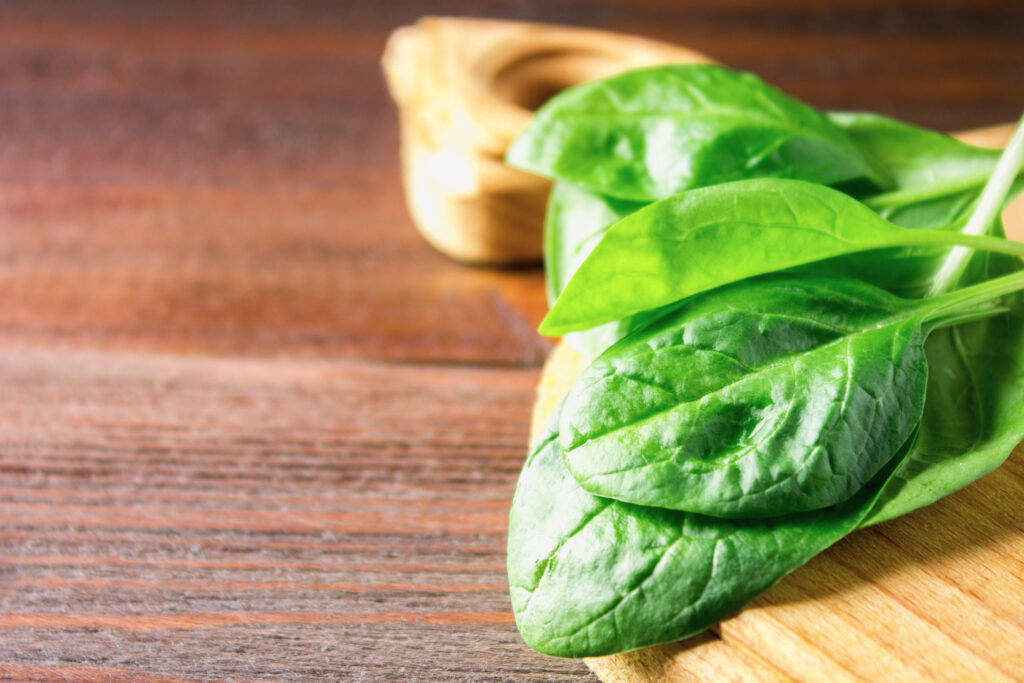
Spinach might be considered a nutritional powerhouse, but this leafy green often carries a shockingly high level of harmful pesticides. And again it’s one of those foods you should only buy organic. Sadly, conventional spinach frequently tests positive for numerous chemicals, including a neurotoxic insecticide called permethrin. This substance is banned for use on food crops across Europe due to its dangers. Opting for organic spinach guarantees you’re getting all the vital nutrients without the unsavory extras. Studies link permethrin exposure to serious health concerns, especially in children, including ADHD and neurological problems. Whether you love it fresh in crisp salads, blended into smoothies for an energy boost, or cooked until tender, choosing organic is the safest bet when it comes to this versatile but potentially contaminated veggie.
3. Kale, Collard & Mustard Greens

These hearty greens are often loaded with nutrients, but sadly they also share a disturbingly high level of pesticide contamination. Thus, they belong to the list of foods you should only buy organic. Kale, collards, and mustard greens frequently test positive for DCPA, a pesticide classified as a possible human carcinogen by the EPA. DCPA was even banned in Europe over 15 years ago due to its dangers. Opting for organic versions of these popular greens ensures you avoid DCPA along with a host of other concerning chemicals. Studies show DCPA can harm the lungs, liver, kidneys, and thyroid, and is a suspected endocrine disruptor. Enjoy their powerful nutrients without the worry by always selecting organic versions of these greens.
4. Grapes

Who doesn’t love grapes as a refreshing snack? Unfortunately, conventional grapes can be loaded with a cocktail of pesticide residues. Studies repeatedly show high levels of numerous chemicals on non-organic grapes, with some linked to serious health risks. One particularly dangerous pesticide used on grapes is paraquat. This highly toxic chemical has been associated with Parkinson’s disease and is even banned in the UK and Canada due to its dangers. Opting for organic grapes protects yourself (especially little ones who love grapes) from these unnecessary chemical exposures and lets you enjoy their full health benefits. From snacking to salads, or even frozen as a fun summer treat, organic grapes ensure you’re getting sweetness and nutrients, not a side of harmful pesticides.
5. Peaches
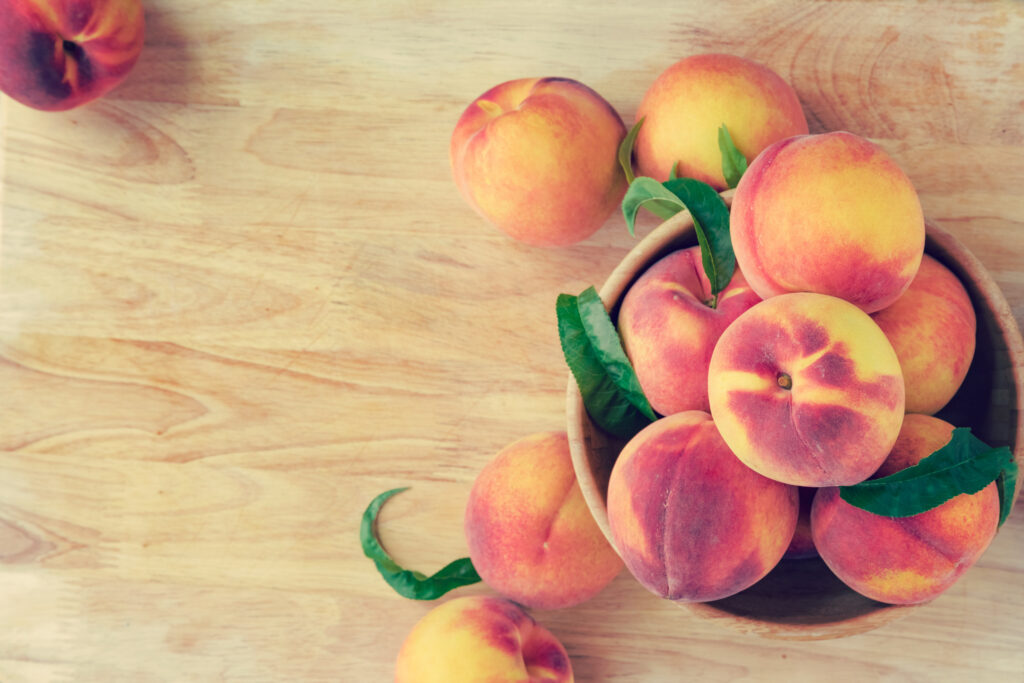
Sweet, juicy peaches are a summer delight, but their fuzzy skin can trap a hefty amount of pesticides. Sadly, conventional peaches often test positive for a cocktail of chemicals, some of which can harm the nervous system and disrupt hormones. Of particular concern are fungicides like fludioxonil and propiconazole, which are found on a large percentage of peaches and have been linked to potential risks like fetal development issues, liver toxicity, and reproductive harm. Opting for organic peaches guarantees you’re getting sweetness without the toxic chemicals and maximizing the enjoyment of this juicy summer staple.
6. Pears
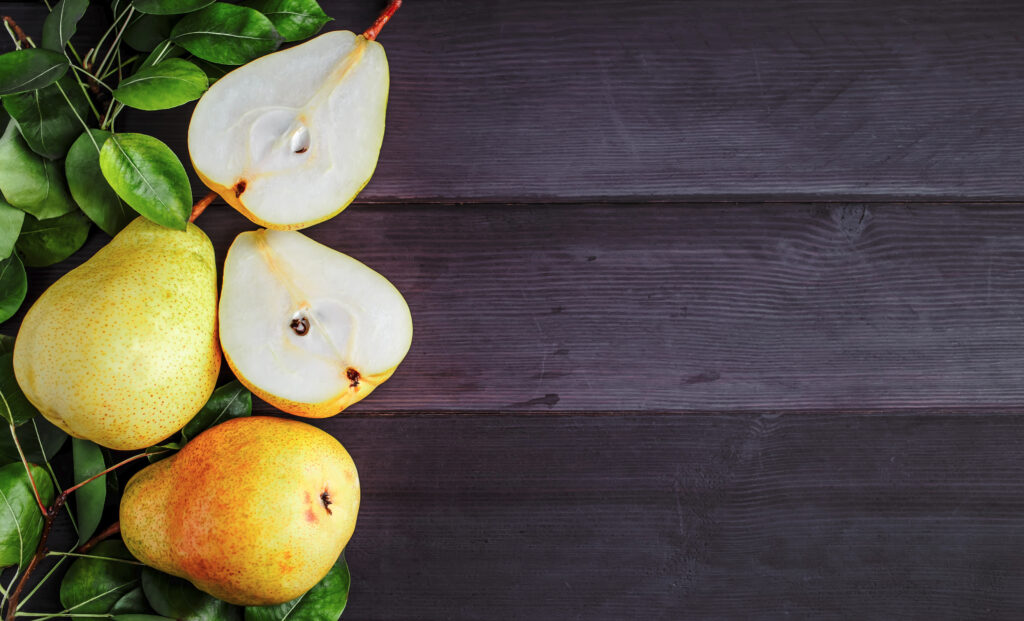
Pears are another fruit where organic simply makes sense. Pesticide residues can lurk stubbornly on those smooth peels, and tests show a disturbing increase in the number of different chemicals found on conventional pears. Over 60% of non-organic pears now contain residues from five or more pesticides! Of particular concern are fungicides like pyrimethanil and fludioxonil, which are applied throughout the growing season and even after harvest. These chemicals are linked to potential hormone disruption and reproductive harm. Choosing organic pears is the safest way to enjoy their gentle sweetness and avoid problematic pesticide exposure.
7. Nectarines
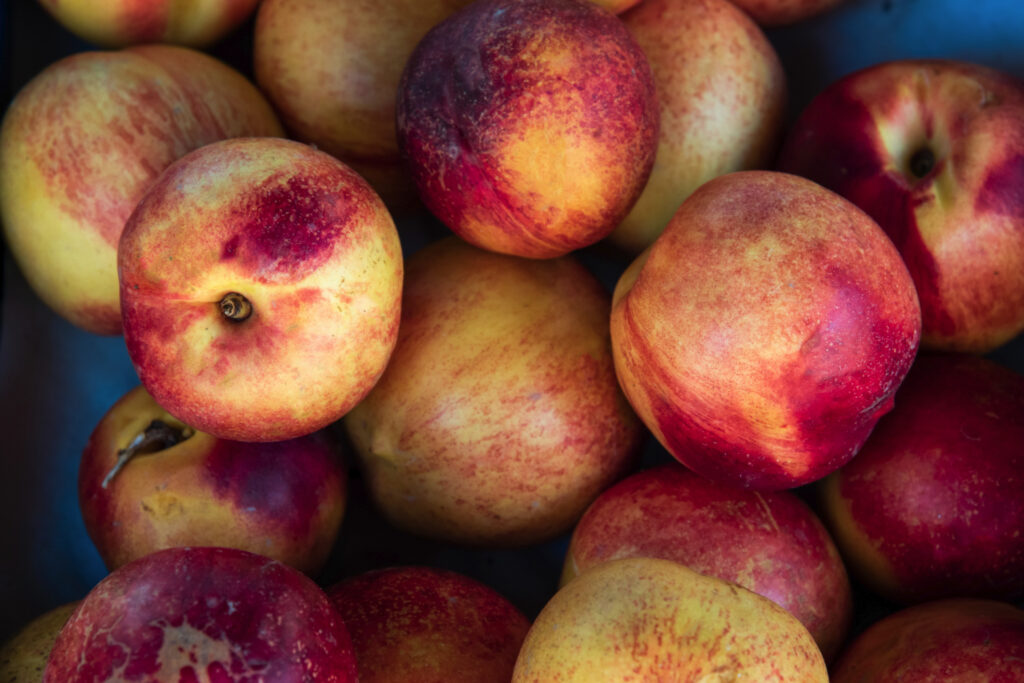
Similar to their peach cousins, nectarines often test high for pesticide contamination. These toxic pesticides can put lives at risk. Their smooth skins make washing less effective, leaving residues from a variety of harmful chemicals. Tests reveal concerning substances on non-organic nectarines, including some linked to hormone disruption, reproductive harm, and even cancer risk. Some of these pesticides, like carbendazim and diphenylamine, are banned in other countries due to their potential dangers. Opting for organic nectarines eliminates these concerns and lets you savor their pure, unadulterated sweetness and flavor.
8. Apples

An apple a day keeps the doctor away… unless it’s loaded with pesticides! Apples are a classic lunchbox staple and a healthy snack, but make sure you’re choosing organic varieties. Apples can be heavily sprayed with chemicals, both before and after harvest. One particularly concerning chemical is diphenylamine, used to prevent discoloration during storage. While deemed safe by the EPA, European regulators have banned its use due to concerns it could form harmful nitrosamines, which are linked to cancer. An organic label is your best defense for worry-free snacking and pure apple enjoyment.
9. Bell & Hot Peppers

Peppers add bright flavor and nutrients to dishes, but they can also carry a hefty pesticide punch. Both sweet bell peppers and their spicy hot pepper cousins frequently rank high in contamination tests. Residues of numerous chemicals can be found on non-organic peppers. Some of these are linked to health concerns, making organic a safer choice for everything from fajitas to stir-fries, or even enjoying raw peppers as a satisfying snack. Opting for organic ensures you get the vibrant flavor and nutrition without the worry of harmful pesticide exposure.
10. Cherries
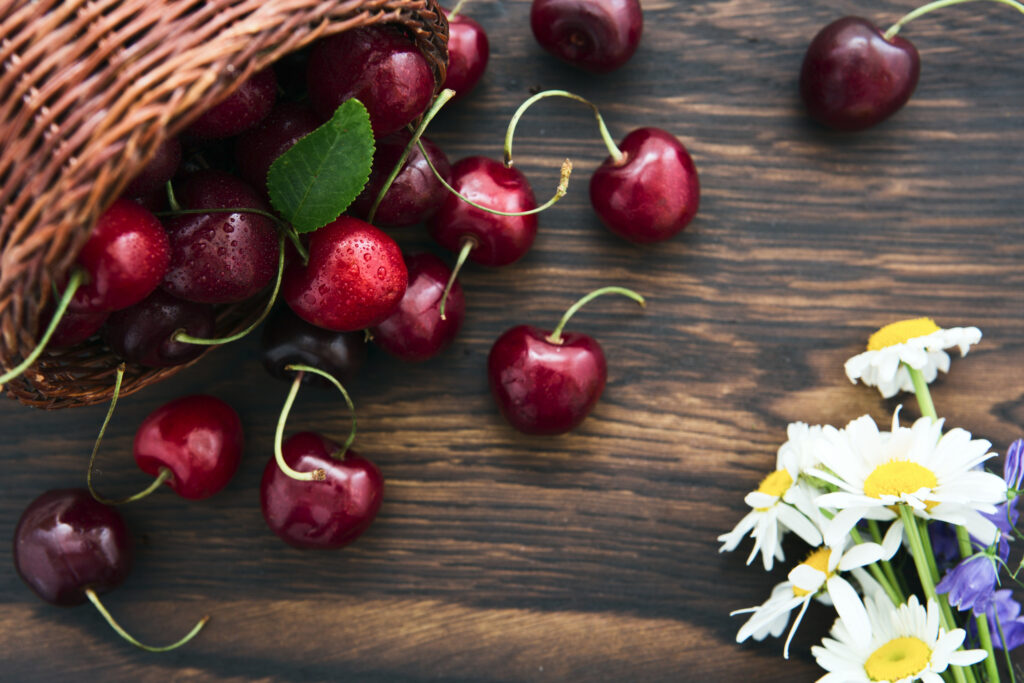
These bite-sized treats are intensely satisfying but often suffer from heavy pesticide residues. Cherries are a prime example of foods you should only buy organic. Growers frequently treat cherries with a variety of chemicals to combat pests and diseases. These residues can persist on the fruit, even after washing and pose potential health risks. Safeguard your enjoyment of these sweet gems by seeking out organic cherries – it’s the best way to guarantee pure flavor and peace of mind. Opting for organic ensures you get the delicious sweetness of cherries without the side of harmful chemicals.
11. Blueberries
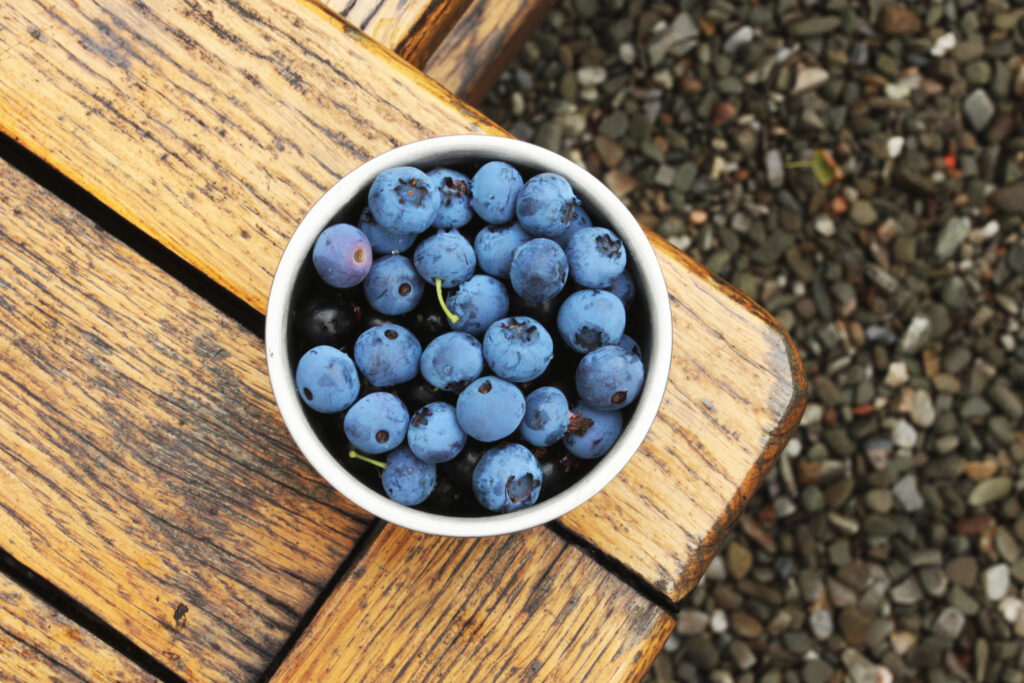
Beloved for their flavor and superfood status, blueberries sadly can also harbor pesticides. Enjoy their healthful properties without the risk by prioritizing organic options. Like many delicate fruits, blueberries are susceptible to pests and diseases, leading to the use of various pesticides. These residues can linger, potentially impacting the health benefits of this antioxidant-rich berry. From topping your cereal to blending into smoothies, choosing organic blueberries means maximizing the benefits, not the worries. Opting for organic ensures you’re getting all the deliciousness and powerful nutrients blueberries offer without any lingering concerns about pesticide exposure.
12. Green Beans
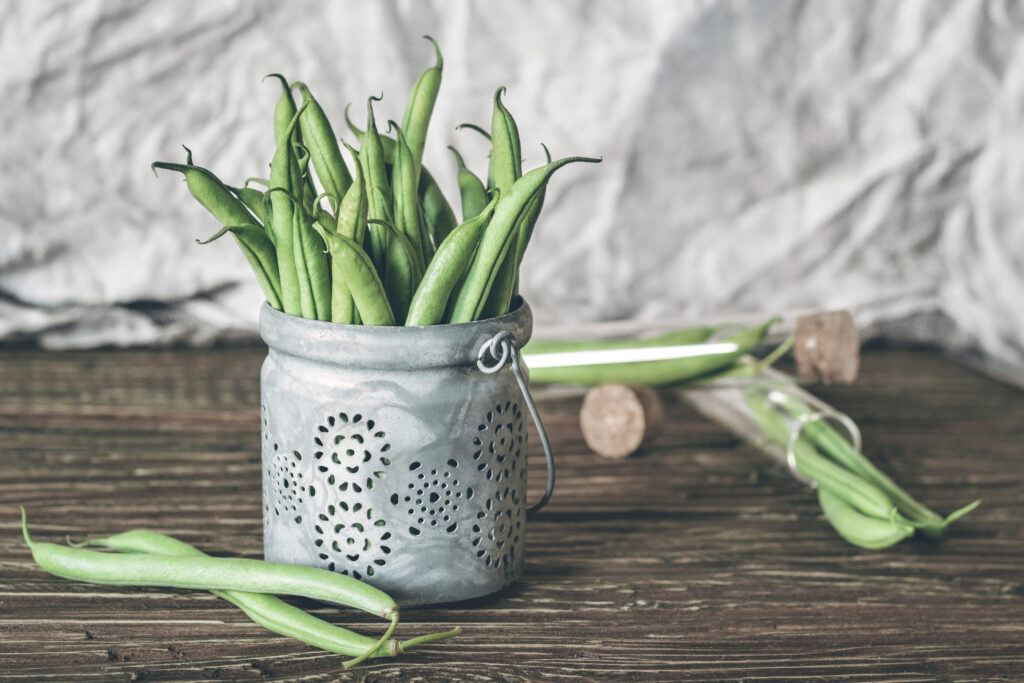
Green beans are a versatile and healthy side dish, but conventional ones can be concerning. Prioritize organic green beans to ensure you’re getting pure nutrition, not a side of chemicals with your dinner. Tests often reveal harmful insecticides like acephate and methamidophos on green beans. Researchers also find a wide variety of other pesticides on non-organic green beans. The EU prohibits some of these chemicals due to their potential health risks.. Choosing organic green beans is the best way to ensure you’re reaping their nutritional benefits without the worry of pesticide exposure.
The Power of Informed Choices

Knowing which foods you should only buy organic lets you make empowered choices for your family’s health. Don’t underestimate the positive impact of going organic, especially for these highly-contaminated items. Making the switch is an investment in the wellbeing of those you love! By choosing organic, you’re not only protecting your family from potential harm, but also supporting farming practices that prioritize health and environmental sustainability.
Read More
15 Guilt-Free Foods You Can Eat to Your Heart’s Content
What People Won’t’ Eat: 11 Surprisingly Healthy Foods That Often Get a Bad Rap

No Comments yet!